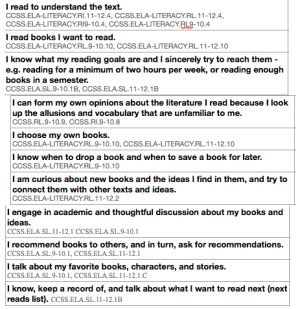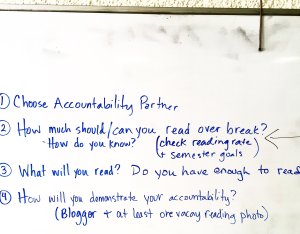Encouraging Independent Readers
The whole point of this reader’s workshop adventure is to encourage and foster independent readers. Readers who pick up Ready, Player One rather than a wii controller. Readers who speculate about what crazy new events will happen to Shy in The Hunted, Matt De La Peña’s action-packed sequel to The Living (both of which, by the way, my own two boys recently devoured), rather than watching the latest youtube channels.
I wish for my students to feel the same excitement and confidence for YA novels that they did when they were littles for The Very Hungry Caterpillar, and to feel that they are confident and capable enough to tackle memoirs like The Glass Castle any day of the week if they want to.
That’s the thing: when my 9th graders made reader’s timelines, there was a buzz in the room. They were excited and confident in their talk about the books they remembered from toddlerhood and childhood. They beamed when they talked about Curious George and Clifford, the Big Red Dog with a fondness I hadn’t heard from them en masse until that day.
I’m not sure they will all have that same buzz about books again until they are fully independent readers, so I’m making it my business to help get them there.
One of the things about the workshop model is that through offering challenge and choice, students can develop their own tastes and habits which lead them to being grown-up readers.
And arguably one of the most essential aspects of the workshop model is conferring with the teacher.
With the teacher.
But I want my students to be independent, healthy readers. So I have to teach them to remove me from the equation. But I have to confer with them to teach them.
Quite a dilemma.
So I think that’s the entry point for introducing reading partners. Why can’t I teach my students to talk to each other about progress towards goals, reading ladders, and to generally encourage healthy reading life habits? To essentially conduct mini-conferences with one another during the first couple of minutes of each class? I can continue to confer with my students on a regular basis, but they can start to keep each other accountable and have rich and deliberate conversation with each other, which is a more authentic healthy reading habit than being held accountable to a teacher.
This is where the healthy reading life profile will come into play. When they have a trusted partner, they will be able to focus on sections like these:

My students will graduate and go on to university, and they won’t have a teacher who wants to confer with them about what they are reading. They have to learn to do that with peers, and to think for themselves about what they are reading.
I think the other key to helping them become independent readers is to help them make individualized plans about how and when they will make time to read. During the regular school week I can check in with them, and they often seek me out in order to share new titles and reflect on books they have recently finished.
Challenges that arise are the long weekends, even longer breaks, and the longest of all, summer vacation.
My school’s spring break is next week, so I’ve started to prep them by asking them to reflect on and decide whether they have enough reading material for the break.
Next, they will write, talk about, and commit to some sort of plan for a personalized spring break goal, whether it’s about the number of hours, number of books, pages, or types of books that might challenge them.
When students write down and discuss their goals, they feel more committed to them. Students find better success, and are farther along down the road of reading with independence when they say their goals out loud, write them down, and have an accountability partner.
So this week, once they have decided on titles, they will engage in deliberate talk with reading partners and conduct a mini-conference. They will look each other in the eye and commit to individual, short term reading goals.

My hope for my students, my budding readers, is that this kind of goal-setting and peer-talk will lead to more reading over the summer, and to minimizing the summer slump that so many students experience.
The school year isn’t over, I still have time to confer and foster independence, and I’m going to give it may all, which may mean at times pulling back a little.
I’ll help them along the way, and I’ll keep conferring with them, but with the end in mind.
Fully independent reading. No conferences. No turn and talks. No book talks. Just some old-fashioned self-reliance.
Originally posted at https://adventuresinhighschoolworkshop.wordpress.com/